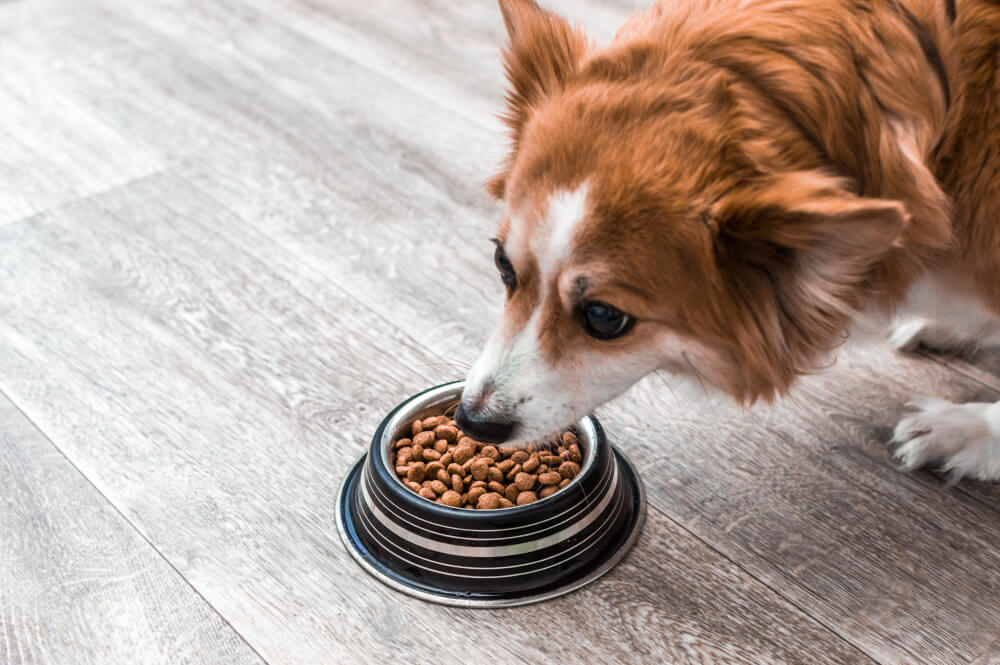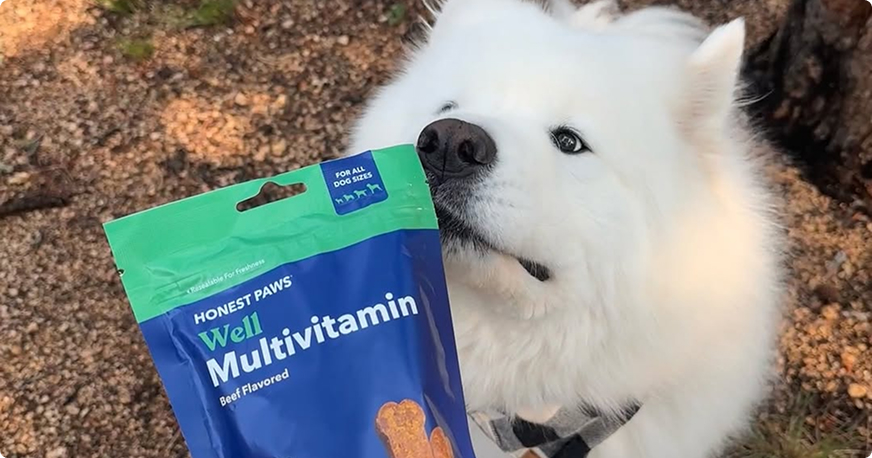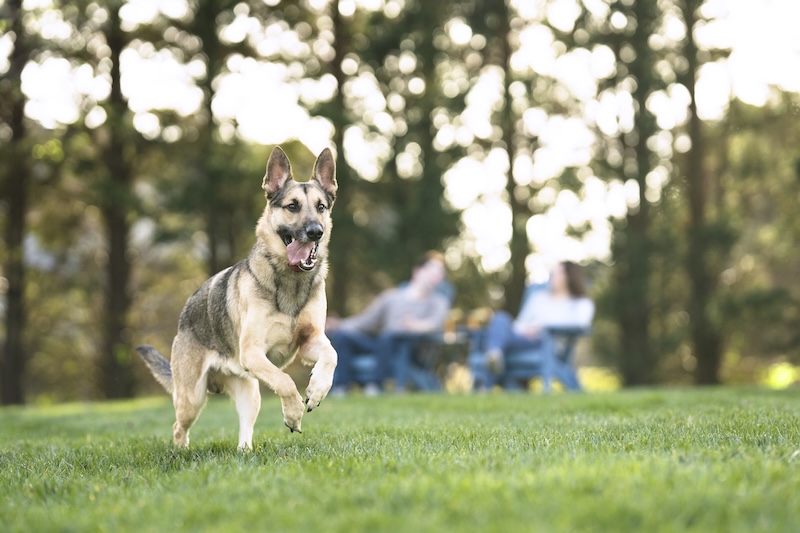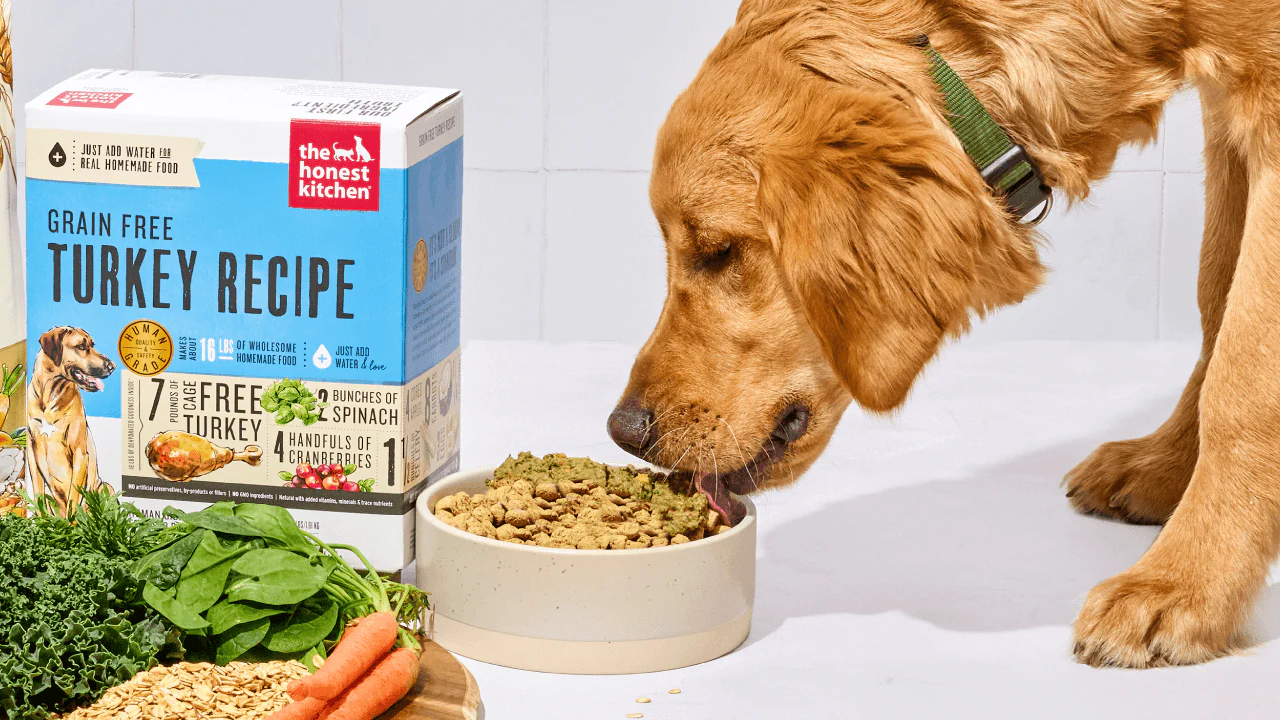Can Dogs Eat Fried Chicken?


Can Dogs Eat Fried Chicken?
Table of Contents
The short answer is no; dogs cannot eat fried chicken. A nutritionally rich and balanced diet is vital for proper health in dogs. Chicken is perfect as it is high in protein, readily available, and highly palatable.
However, not all chicken types are recommended for dogs. For example, dogs cannot eat fried chicken. Fried chicken is high in fat and often contains hazardous ingredients. The brittle bones in fried chicken are another danger. There really are no health benefits when it comes to feeding your dog fried chicken.
Pet owners asking “Can dogs eat chicken?” must rest assured that the answer is yes. However, the chicken should be deboned and have the skin removed, and then ideally, boiled plain.
Always consult a veterinarian or canine nutritionist before adding chicken or any other new food to your dog’s menu. Chicken is generally healthy, but it may cause allergies in sensitive dogs.
How Does Fried Chicken Affect a Dog’s Health?
Fried chicken can negatively affect a dog’s health. Fried chicken is not directly toxic to dogs, but it is unhealthy and, depending on the ingredients it contains, can result in poisoning.
Fried chicken poses several risks for dogs. One of the main problems is its fat content. Eating fried chicken can upset the dog’s stomach, leading to vomiting and diarrhea.
In more severe cases, the fat content in fried chicken can provoke pancreatitis, a potentially life-threatening inflammation of the pancreas.
Intentional feeding of fried chicken to dogs is highly inadvisable, while accidental consumption is classified as a dietary indiscretion.
Fried chicken is also harmful to dogs that are allergic to chicken protein. Food allergies are common in dogs. Certain breeds, such as West Highland White Terriers, Rhodesian Ridgebacks, and Pugs, are predisposed to food allergies, reports a research paper, “A Prospective Study on Canine Atopic Dermatitis and Food-Induced Allergic Dermatitis in Switzerland,” published in Veterinary Dermatology in 2018.
Why Is Fried Chicken Bad for Dogs?
Fried chicken is bad for dogs for several reasons, including high fat content, toxic seasoning, splintering bones, and nutritional deficits.
Fried chicken contains a high amount of fat, which can cause stomach upset or even pancreatitis. Eating too much fat in the long run can lead to weight gain and obesity. Obesity increases the risk of other conditions, such as arthritis, heart problems, diabetes, and certain cancer types.
The fried chicken breading is often seasoned with potentially toxic spices, like garlic and onion. The bones of fried chicken are extremely brittle and prone to splintering. Splintered bones are a choking hazard and can result in internal injuries.
Finally, fried chicken is not a complete and balanced diet for dogs. Eating solely fried chicken, even if it does not trigger the above-explained conditions, will eventually lead to nutritional deficiencies.
Can Dogs Eat Popeyes Chicken?
No, dogs cannot eat Popeyes chicken. Popeyes chicken is deep-fried and heavily seasoned. Fat wreaks havoc on the dog’s digestive system and can cause pancreatitis and weight gain.
The seasoning used in Popeyes chicken is harmful to dogs. Depending on the exact spice used, the dog can develop stomach upset or intoxication.
Popeyes chicken is not a suitable treat for dogs. A dog that stole a chunk is probably going to be okay, but you should never feed the dish on purpose.
Can Dogs Eat Popcorn Chicken?
No, dogs cannot eat popcorn chicken. Popcorn chicken is high in fats, carbs, and salt and can contain potentially toxic ingredients.
An occasional and accidental bite of a piece or two of popcorn chicken is not troublesome, but feeding on purpose is highly inadvisable.
Air-popped and plain popcorn chicken can be given to dogs as an occasional treat. However, it is much better to serve boiled chicken breasts.
Can Dogs Eat Chicken Patties?
Yes, dogs can eat chicken patties, but only if prepared correctly and in moderation. Dog-friendly chicken patties are made with safe vegetables and seasonings. Ideally, they are cooked in the oven and not fried.
Chicken patties, even when prepared correctly, must not be overfed as they are not part of the dog’s natural diet.
Can Dogs Eat Chicken Tenders?
Yes, but the exact recommendation depends on the type of chicken tenders you are using. Plain, cooked chicken tenders are healthy and safe for dogs.
However, store-bought, processed chicken tenders are not. Store-bought chicken tenders are often breaded, fried, or seasoned, hence unsuitable for dogs.
Breaded chicken tenders are high in carbohydrates, while fried tenders are fatty. Spiced tenders can also be problematic if they contain potentially toxic ingredients, such as garlic or onion.
Can Dogs Eat Fried Chicken Skin?
No, dogs cannot eat fried chicken skin. Fried chicken skin is high in fat, which can potentially lead to digestive problems and pancreatitis.
Consuming excessive fats in the long run can lead to weight gain and obesity. Fried chicken skin can also be seasoned with salt, garlic, and onion, all of which are toxic.
Lastly, fried chicken skin has a chewy texture, and dogs with voracious appetites are likely to swallow it without chewing. In such cases, it is a choking hazard.
Can Dogs Eat Fried Chicken Livers?
No, dogs cannot eat fried chicken livers. Chicken livers are a healthy addition to a balanced diet for dogs. However, they must be adequately prepared, and frying is not a canine-friendly cooking method.
Chicken liver for a dog is best served boiled. Chicken livers are packed with proteins, vitamins A, B, C, and E, and minerals, such as copper, zinc, and iron.
Frying adds unnecessary fats to chicken livers, increasing the dog’s risk of digestive problems and acute pancreatitis episodes or weight gain and obesity in the long run.
Can Dogs Eat Fried Chicken Without Skin?
Yes, dogs can eat fried chicken without the skin, but only in small amounts and under rare circumstances. For example, if a dog steals a bite or so, it is unlikely that it will cause problems.
However, feeding fried chicken, even without the skin, on purpose, is inadvisable. Chicken skin for a dog is not dangerous on its own.
Fried chicken is not recommended because it is high in fat. The skin is also hazardous because it may contain added spices and seasonings. Certain herbs, such as garlic and onion, are toxic to dogs.
When is Fried Chicken Good for Dogs?
Fried chicken is never good for dogs. Frying is a method of thorough cooking that strips away the beneficial nutrients and adds fats.
The possible risks of eating fried chicken outweigh the perks. Therefore, fried chicken is not okay for dogs.
However, fried chicken can be used as a pill pocket for dogs with fussy appetites. Pet owners can use chunks of fried chicken to wrap pills that are otherwise hard to give.
Using fried chicken as a pill pocket is a one-time solution and is more suitable for large dogs, as a single bite is unlikely to cause digestive troubles.
What to Consider Before Giving Your Dog Fried Chicken?
Consider the potential risks before giving your dog fried chicken. The dangers of fried chicken, in general, outweigh the possible benefits.
If considering using fried chicken as a pocket pill, however, it is recommended that you take into consideration factors such as the dog’s size and overall health.
Medium to large dogs can eat a chunk of fried chicken without consequences. In contrast, small dogs are more likely to develop stomach issues.
The dog’s health is a critical factor as well. For example, you should never give fried chicken to a dog with a sensitive tummy or a history of pancreatitis.
How Much Fried Chicken Can Dogs Have?
Dogs should not be given fried chicken intentionally. Generally, the portion size of any food depends on factors such as age, weight, and activity level.
Fried chicken, however, is unhealthy and should not be fed to dogs. Still, it is important to know how much a dog can eat (in case of an accident) without developing consequences.
For example, small dogs (less than 20 pounds) cannot eat fried chicken at all. Medium dogs (between 20 and 50 pounds) can have one or two fried chicken bites. Large dogs (over 50 pounds) can eat up to three or four bites.
Once again, these are not recommended feeding guidelines, but approximate estimations of how much fried chicken is safe.
What Happens if a Dog Accidentally Eats Fried Chicken?
If a dog eats fried chicken, it can digest it without issues or develop health issues, ranging from stomach upset to pancreatitis. What happens depends on how much the dog ate, its size, and overall health.
After eating fried chicken, dogs sensitive to chicken protein can also develop an allergy. Chicken allergy in dogs is widespread.
Chicken is the third most frequently reported food allergen in dogs, following beef and dairy, according to a study, “Critically Appraised Topic on Adverse Food Reactions of Companion Animals (2): Common Food Allergen Sources in Dogs and Cats,” published in BMC Veterinary Research in 2016.
Chicken allergies in dogs manifest with gastrointestinal or skin symptoms. Diarrhea is the primary gastrointestinal symptom, while itchiness suggests a skin manifestation.
Can Too Much Fried Chicken Affect a Dog’s Digestion?
Yes, consuming too much fried chicken can affect a dog’s digestion. Dogs are generally well-suited for digesting fats and require them as an energy source.
“The US National Academies recommend that adult dogs consume 12% of their daily calories from fat,” reports a study, “Fat Content in Dog Food,” published in Creature Companion in 2017.
However, too much fat can wreak havoc on the digestive system. It causes stomach upsets, resulting in episodes of vomiting, diarrhea, and loss of appetite.
What Should You Do if Your Dog Accidentally Eats Fried Chicken?
If your dog ate fried chicken, you should monitor it carefully for signs of distress. Pay attention to the dog’s behavior and watch for signs of digestive upsets, such as vomiting and diarrhea.
Loss of appetite and abdominal pain are also possible and could indicate acute pancreatitis. If you suspect your dog has pancreatitis, it is imperative to seek veterinary help.
Vomiting and diarrhea in a dog that ate fried chicken can suggest a food allergy. Other signs that can support a chicken allergy diagnosis include itchy skin, paw licking, and red, inflamed ears.
Which Other Chicken Products Can Be Given to Dogs?
The other chicken products that can be given to dogs are listed below.
- Chicken Rotisserie: Chicken rotisserie can be served to dogs, but only if the skin and bones are removed before serving. The chicken rotisserie meat is high in protein, and dogs love its taste.
- Chicken Nuggets: Chicken nuggets can be given to dogs, but only if they are adequately prepared. Store-bought chicken nuggets are often unhealthy due to their heavy processing and potential inclusion of artificial ingredients.
- Canned Chicken: Low-sodium and unseasoned canned chicken is safe for dogs. Canned chicken is packed with protein and straightforward to use. Always read the label to ensure the product is free from salt and potentially harmful spices.
1. Rotisserie Chicken for Dogs
Rotisserie chicken is safe for dogs when prepared correctly and served occasionally. Rotisserie chicken should be offered to your dog with the skin and bones removed.
The skin is chewy and likely to be seasoned with potentially harmful spices, including garlic and onion. The bones pose a choking hazard and may cause injury to the dog’s gastrointestinal tract.
Chicken rotisserie is a healthy source of protein when served as explained. However, it is better to use plain, boiled chicken instead of rotisserie.
2. Chicken Nuggets for Dogs
Chicken nuggets are not recommended for dogs. Chicken nuggets are high in sodium, fats, and processed ingredients, potentially causing stomach upsets, pancreatitis, or intoxications.
Giving the dog a chicken nugget or two may not cause problems. However, you should not use them intentionally, especially not frequently or in large amounts.
As an alternative to potentially risky commercially available chicken nuggets, you can prepare homemade chicken nuggets for dogs with pet-friendly ingredients.
3. Canned Chicken for Dogs
Canned chicken for dogs can be used as an occasional treat or meal addition as it is high in protein, tasty, and easy to prepare.
However, it is vital to choose plain, unseasoned canned chicken that is free from salt, spices, and artificial additives. Always read the ingredient list carefully before serving canned chicken to your dog.
If you are wondering, “Can dogs eat canned chicken?” The answer is yes. However, it is better to use a healthier option, such as plain boiled or air-fried chicken breasts or thighs.
What Chicken Preparations Can Dogs Have Other Than Fried Chicken?
1. Boiled Chicken for Dogs
Boiled chicken is a nutrient-dense and high-protein food for dogs. Plus, it is easily digestible and versatile, making it suitable as a staple ingredient or treat. Dogs love the taste of boiled chicken and can eat it daily.
Boiled chicken for dogs, however, must be prepared correctly – cooked thoroughly and without salt and seasoning. Ideally, select boneless, skinless chicken breasts or thighs. Always let the boiled chicken cool down and shred it into smaller pieces before serving.
2. Raw Chicken for Dogs
Raw chicken for dogs is a controversial topic. Raw diets have surged in popularity in recent years, but many veterinarians and veterinary organizations remain skeptical.
On one hand, raw chicken for dogs has its nutrients intact. On the other hand, it may carry bacteria such as Salmonella and E. coli, which can cause food poisoning. Always consider both the pros and cons before deciding whether to serve your dog raw chicken.


















